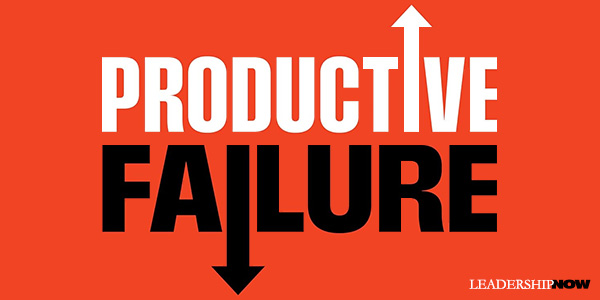 |
 |
05.21.25

Productive Failure
HOW do people learn? Simply put, when the reality does not meet the expectation. When we make mistakes. When we fail. And when we learn from those mistakes, we learn not only the correct way to go, but we gain a deeper understanding of the issue and thus are able to more easily apply it to similar situations. In other words, if we try to solve the problem before we are told how to do it, we learn better. Manu Kapur wrote Productive Failure with this in mind. “The idea of Productive Failure is to be proactive; that is, if failure is so powerful for learning, then we should not wait for it to happen. We should intentionally design for it for deep learning.” Kapur began his career as a math teacher. He thought “if he could engage his students, explain the concepts as clearly as possible, then show them, step-by-step, exactly what to do and how to do it, he’d achieve transformational results.” This is the direct instruction method that we are all accustomed to—the teacher lectures, we practice, and we learn. It feels right. It feels logical. However, the problem with the direct instruction method is that while we feel we’ve learned, our understanding is often largely superficial. “The problem was not that we learn poorly from bad lectures, but rather that we learn poorly from excellent ones. Not learning well from bad lectures is understandable and explainable. Not learning well from good lectures is perplexing, even shocking.” The solution to the paradox lies in realizing that the first job of teaching is actually not to teach. The first job of teaching is to prepare the novice to see with an expert’s eyes. In contrast to Direct Instruction, Discovery Learning asks the learner to figure out how to apply their existing knowledge to the problem first. “Discovery Learning emphasizes active engagement and self-exploration as the primary drivers of acquiring new knowledge.” Discover Learning asks you to transfer your existing knowledge to new contexts. Activating prior knowledge helps us to make sense of new information. It develops curiosity and open-mindedness. This kind of learning is the most valuable in dynamic and uncertain environments, and what we need more of in people at all levels. “Struggling a bit with the problem helps you learn better than if someone just explains the answers. Before we can repair or resolve our misconceptions or failures, we need to become aware of them in the first place.” An awareness of all we do not know is the beginning of knowledge and wisdom. The gap between what we know and what we don’t know sets us up to learn. So, how do we use this? As in teaching, as leaders and mentors, we can learn from this: “We are quick to see what is wrong in students’ answers and reasoning. We are quick to zone in on that which is incorrect, so that we can quickly and robustly correct it. What we are not good at is analyzing students’ incorrect answers to see if there are elements in those answers, bits and pieces, and components, that could be used as building blocks for helping them learn the correct concept.” What is right in the wrong answer? “Deep understanding requires that we are able to see what is critical and connect it with our prior knowledge.” Productive Failure helps us to reassemble components in our knowledge in a new way to solve new and harder problems. Tasks can be designed to be challenging and accessible. “Productive Failure is good for learning things that you need to deeply understand and transfer to novel situations,” like the adaptive challenges we face today. We are not trying to design for failure for failure's sake, but to design in such a way that we have to think through the challenge and see it in different ways. 
Posted by Michael McKinney at 05:13 PM
|
BUILD YOUR KNOWLEDGE
 

How to Do Your Start-Up Right STRAIGHT TALK FOR START-UPS 
Grow Your Leadership Skills NEW AND UPCOMING LEADERSHIP BOOKS 
Leadership Minute BITE-SIZE CONCEPTS YOU CAN CHEW ON 
Classic Leadership Books BOOKS TO READ BEFORE YOU LEAD |